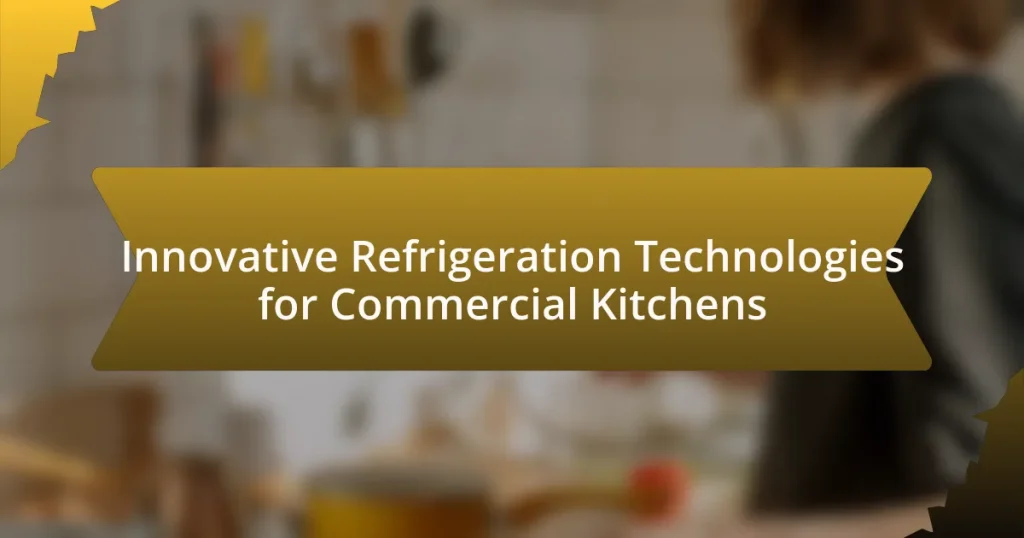The article focuses on the importance of maintaining commercial kitchen appliances to ensure their longevity and optimal performance. It highlights the benefits of regular maintenance, including reduced repair costs, enhanced food safety, and increased energy efficiency. Key topics covered include the signs that indicate appliances need maintenance, the impact of neglecting upkeep on kitchen operations, and specific maintenance needs for various appliances such as refrigeration units, ovens, and dishwashers. Additionally, the article discusses best practices for maintenance, the role of technology in monitoring appliance performance, and common troubleshooting tips to quickly resolve minor issues.
What is the Importance of Maintaining Commercial Kitchen Appliances?
Maintaining commercial kitchen appliances is crucial for ensuring their longevity and optimal performance. Regular maintenance prevents breakdowns, reduces repair costs, and enhances food safety by ensuring that equipment operates efficiently and hygienically. For instance, according to the National Restaurant Association, proper maintenance can extend the lifespan of kitchen equipment by up to 30%, which translates to significant savings for businesses. Additionally, well-maintained appliances consume less energy, contributing to lower utility bills and a reduced environmental footprint.
How does regular maintenance impact appliance longevity?
Regular maintenance significantly enhances appliance longevity by preventing wear and tear, ensuring optimal performance, and reducing the likelihood of breakdowns. Routine tasks such as cleaning, inspecting, and servicing appliances help identify potential issues before they escalate, thereby extending the lifespan of the equipment. For instance, a study by the Appliance Standards Awareness Project found that regular maintenance can increase the lifespan of commercial kitchen appliances by up to 30%, demonstrating the critical role of consistent upkeep in maximizing durability and efficiency.
What are the signs that an appliance needs maintenance?
Signs that an appliance needs maintenance include unusual noises, inconsistent performance, and visible wear or damage. Unusual noises, such as grinding or rattling, often indicate mechanical issues that require attention. Inconsistent performance, such as fluctuating temperatures in refrigeration units, suggests that the appliance is not functioning optimally and may lead to food safety concerns. Visible wear or damage, such as frayed cords or rust, can compromise the appliance’s efficiency and safety. Regularly monitoring these signs can prevent costly repairs and extend the lifespan of commercial kitchen appliances.
How can neglecting maintenance affect kitchen operations?
Neglecting maintenance can severely disrupt kitchen operations by leading to equipment failures and inefficiencies. When kitchen appliances are not regularly serviced, they are more likely to break down, resulting in unexpected downtime that can halt food preparation and service. For instance, a study by the National Restaurant Association indicates that equipment failures can lead to revenue losses of up to 30% during peak hours. Additionally, poorly maintained equipment can consume more energy, increasing operational costs and negatively impacting profit margins. Regular maintenance ensures that appliances operate at optimal efficiency, thereby supporting consistent kitchen productivity and service quality.
What are the common types of commercial kitchen appliances?
Common types of commercial kitchen appliances include ovens, refrigerators, fryers, grills, and dishwashers. Ovens are essential for baking and roasting, while refrigerators are crucial for food preservation. Fryers are used for cooking items like fries and chicken, and grills are popular for preparing meats and vegetables. Dishwashers facilitate the cleaning of kitchenware efficiently. These appliances are vital for the operation of any commercial kitchen, ensuring food safety and quality while enhancing productivity.
How do different appliances require different maintenance approaches?
Different appliances require different maintenance approaches due to their unique functions, components, and operational environments. For instance, refrigeration units necessitate regular cleaning of coils and checking of seals to maintain efficiency, while ovens require periodic calibration and cleaning of burners to ensure even cooking. Dishwashers, on the other hand, need routine checks of filters and spray arms to prevent clogs and ensure optimal performance. Each appliance’s specific maintenance needs stem from its design and usage patterns, which directly impact its longevity and efficiency in a commercial kitchen setting.
What are the specific maintenance needs for refrigeration units?
Refrigeration units require regular maintenance to ensure optimal performance and longevity. Key maintenance needs include checking and cleaning condenser coils, which should be done at least twice a year to prevent overheating and inefficiency. Additionally, inspecting door seals for wear and tear is crucial, as damaged seals can lead to temperature fluctuations and increased energy costs. Regularly monitoring refrigerant levels is also essential; low levels can indicate leaks that need immediate attention. Furthermore, cleaning the evaporator fan and ensuring proper airflow around the unit are necessary to maintain efficiency. These practices are supported by industry standards, which emphasize that routine maintenance can extend the lifespan of refrigeration units by up to 30%.
What are the Best Practices for Maintaining Commercial Kitchen Appliances?
The best practices for maintaining commercial kitchen appliances include regular cleaning, routine inspections, proper usage, and timely repairs. Regular cleaning prevents the buildup of grease and food particles, which can lead to malfunctions; for instance, the U.S. Food and Drug Administration recommends cleaning surfaces and equipment daily to ensure food safety. Routine inspections help identify wear and tear early, allowing for proactive maintenance; studies show that preventative maintenance can extend the lifespan of equipment by up to 30%. Proper usage according to manufacturer guidelines minimizes damage and ensures efficiency; improper use is a leading cause of appliance failure. Finally, timely repairs prevent minor issues from escalating into major problems, which can be costly and disruptive to operations.
How often should maintenance be performed on kitchen appliances?
Maintenance on kitchen appliances should be performed at least once a year. Regular annual maintenance helps ensure optimal performance and longevity of appliances, as it allows for the identification and resolution of potential issues before they escalate. According to the National Fire Protection Association, improper maintenance can lead to appliance malfunctions and safety hazards, emphasizing the importance of routine checks.
What factors influence the frequency of maintenance?
The frequency of maintenance is influenced by several key factors, including the type of equipment, usage intensity, operating environment, and manufacturer recommendations. Equipment such as ovens, refrigerators, and dishwashers require different maintenance schedules based on their complexity and function. High-usage appliances, for instance, necessitate more frequent checks and servicing due to wear and tear. Additionally, environments with high humidity or grease can accelerate deterioration, prompting increased maintenance needs. Manufacturer guidelines often provide specific maintenance intervals, which are crucial for ensuring optimal performance and longevity of the appliances.
How can a maintenance schedule be effectively implemented?
A maintenance schedule can be effectively implemented by establishing a clear timeline for regular inspections and servicing of kitchen appliances. This involves identifying the specific maintenance tasks required for each appliance, assigning responsibilities to staff, and utilizing a tracking system to monitor compliance with the schedule. Research indicates that regular maintenance can extend the lifespan of commercial kitchen equipment by up to 30%, as noted in the study “The Impact of Preventive Maintenance on Equipment Lifespan” published in the Journal of Facilities Management.
What are the essential maintenance tasks for various appliances?
Essential maintenance tasks for various appliances include regular cleaning, inspection, and servicing to ensure optimal performance and longevity. For refrigeration units, cleaning condenser coils and checking door seals are crucial to maintain efficiency. Ovens require periodic cleaning of burners and checking ignition systems to prevent malfunctions. Dishwashers benefit from descaling and cleaning filters to enhance water flow and efficiency. Fryers need oil filtration and temperature calibration to ensure food quality and safety. Regular maintenance not only extends the lifespan of these appliances but also reduces the risk of costly repairs and downtime in a commercial kitchen setting.
How should ovens and ranges be cleaned and maintained?
Ovens and ranges should be cleaned and maintained by regularly removing food debris, wiping surfaces with appropriate cleaners, and checking for any signs of wear or malfunction. Regular cleaning involves using a mixture of warm water and mild detergent to wipe down the exterior and interior surfaces, ensuring that any spills or stains are addressed promptly to prevent buildup. Additionally, the oven’s self-cleaning feature can be utilized periodically, following the manufacturer’s instructions, to maintain optimal performance. Maintenance includes inspecting the burners, ensuring they ignite properly, and checking the oven’s temperature accuracy with an oven thermometer. Regularly replacing worn-out parts, such as oven seals and burner caps, is essential for efficiency and safety. These practices help extend the lifespan of ovens and ranges, ensuring they operate effectively in a commercial kitchen setting.
What specific care do dishwashers require for optimal performance?
Dishwashers require regular cleaning and maintenance for optimal performance. This includes cleaning the filter to prevent clogs, checking and cleaning spray arms to ensure proper water distribution, and inspecting door seals for wear and tear. Additionally, using the appropriate detergent and ensuring that the water temperature is set correctly (typically around 120°F to 150°F) enhances cleaning efficiency. Regularly descaling the dishwasher, especially in areas with hard water, prevents mineral buildup that can impair functionality. These practices help maintain the dishwasher’s efficiency and prolong its lifespan.
What Tools and Resources are Available for Appliance Maintenance?
Tools and resources available for appliance maintenance include basic hand tools, specialized appliance repair tools, maintenance manuals, and online resources. Basic hand tools such as screwdrivers, wrenches, and pliers are essential for general repairs and adjustments. Specialized tools like multimeters and appliance-specific repair kits facilitate troubleshooting and repairs for specific appliances. Maintenance manuals provide detailed instructions for servicing various appliances, while online resources, including manufacturer websites and instructional videos, offer guidance and troubleshooting tips. These tools and resources collectively enhance the efficiency and effectiveness of appliance maintenance, ensuring longevity and optimal performance.
What tools are essential for performing maintenance tasks?
Essential tools for performing maintenance tasks in commercial kitchens include screwdrivers, wrenches, pliers, and cleaning supplies. Screwdrivers are necessary for assembling and disassembling appliances, while wrenches are crucial for tightening or loosening bolts and nuts. Pliers assist in gripping and manipulating small components. Additionally, cleaning supplies such as degreasers and sanitizers are vital for maintaining hygiene and functionality. These tools collectively ensure that kitchen appliances operate efficiently and have a prolonged lifespan.
How can proper tools enhance the maintenance process?
Proper tools significantly enhance the maintenance process by increasing efficiency and accuracy in tasks. When maintenance personnel use specialized tools designed for specific appliances, they can perform repairs and inspections more effectively, reducing the time spent on each task. For instance, using a calibrated thermometer ensures precise temperature readings, which is crucial for food safety in commercial kitchens. Additionally, tools like multi-meters can quickly diagnose electrical issues, minimizing downtime. Studies show that proper tool usage can decrease maintenance time by up to 30%, leading to improved operational efficiency and extended equipment lifespan.
What resources are available for training staff on appliance care?
Resources available for training staff on appliance care include manufacturer training programs, online courses, and instructional manuals. Manufacturer training programs often provide hands-on experience and detailed information specific to their appliances, ensuring staff understand proper usage and maintenance. Online courses, such as those offered by culinary schools or industry organizations, cover best practices and troubleshooting techniques. Instructional manuals, which accompany appliances, serve as essential references for operational guidelines and maintenance schedules. These resources collectively enhance staff knowledge and skills, contributing to the longevity of commercial kitchen appliances.
How can technology assist in maintaining kitchen appliances?
Technology assists in maintaining kitchen appliances through smart monitoring systems and predictive maintenance tools. Smart appliances equipped with sensors can track usage patterns and alert users to potential issues before they escalate, thereby reducing downtime and repair costs. For instance, connected refrigerators can notify users of temperature fluctuations, which may indicate a malfunction, allowing for timely intervention. Additionally, predictive maintenance software analyzes data from appliances to forecast when maintenance is needed, optimizing performance and extending the lifespan of the equipment. This proactive approach is supported by studies showing that predictive maintenance can reduce maintenance costs by up to 30% and increase equipment lifespan by 20%.
What are the benefits of using maintenance management software?
Maintenance management software enhances operational efficiency by streamlining maintenance processes, reducing downtime, and improving asset longevity. This software allows for better scheduling of maintenance tasks, tracking of equipment performance, and management of inventory, which collectively lead to cost savings and increased productivity. According to a study by the Aberdeen Group, organizations using maintenance management software can achieve a 10-20% reduction in maintenance costs and a 25% increase in equipment uptime, demonstrating its effectiveness in optimizing maintenance operations.
How can smart appliances contribute to easier maintenance?
Smart appliances contribute to easier maintenance by providing real-time monitoring and diagnostics. These devices can alert users to potential issues before they escalate, allowing for timely interventions. For example, smart refrigerators can notify users of temperature fluctuations, which helps prevent food spoilage and reduces the risk of costly repairs. Additionally, many smart appliances offer remote troubleshooting capabilities, enabling technicians to diagnose problems without needing to be physically present, thus saving time and reducing service costs.
What are the Common Troubleshooting Tips for Kitchen Appliances?
Common troubleshooting tips for kitchen appliances include checking power sources, inspecting for blockages, ensuring proper settings, and cleaning components. For instance, if an appliance is not turning on, verifying that it is plugged in and that the outlet is functioning is essential. Additionally, if a refrigerator is not cooling, checking the condenser coils for dirt and ensuring the door seals are intact can resolve the issue. Regular maintenance, such as cleaning filters and checking for leaks, can prevent many common problems. These practices are supported by appliance manufacturers who recommend routine checks to enhance appliance longevity and efficiency.
How can minor issues be identified and resolved quickly?
Minor issues can be identified and resolved quickly by implementing regular maintenance checks and utilizing diagnostic tools. Regular inspections of commercial kitchen appliances help in spotting early signs of wear or malfunction, such as unusual noises or performance drops. Additionally, employing diagnostic tools, like temperature probes or pressure gauges, allows for precise monitoring of appliance performance, enabling swift identification of issues. According to the National Restaurant Association, proactive maintenance can reduce equipment failure rates by up to 50%, demonstrating the effectiveness of these methods in ensuring operational efficiency.
What are the best practices for documenting maintenance activities?
The best practices for documenting maintenance activities include maintaining detailed records of all maintenance tasks performed, including dates, descriptions, and personnel involved. This practice ensures accountability and provides a historical reference for future maintenance needs. Additionally, using standardized forms or digital systems can enhance consistency and accessibility of information. Regularly reviewing and updating documentation helps identify recurring issues and informs preventive measures. According to the National Institute of Standards and Technology, effective documentation can improve operational efficiency and compliance with safety regulations.



